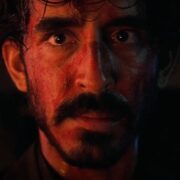45 YEARS: Cinema At Its Most Intimate
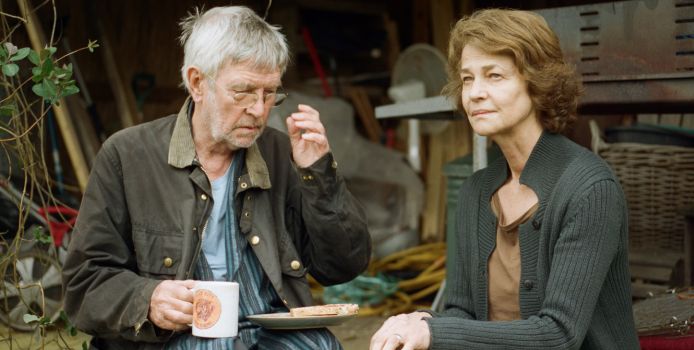
Alistair is a 25 year old writer based in Cambridge.…
45 Years is unquestionably well-written and well-acted, to such a high degree that is literally impossible to argue otherwise. To say that Charlotte Rampling and Tom Courtenay give two of the most emotionally effective performances of their long and illustrious careers is equivalent to saying that the sky is blue and the world is round; it is so plainly obvious, arguing in its favour seems like a waste of time, as the greatness is clearly there for all to see.
Emotionally engaging from the opening minutes
On paper, the film feels like the opposite of director Andrew Haigh’s previous film Weekend; that film was about two men who meet and fall in love over the course of (you guessed it) a weekend, after a one night stand turns into something deeper. 45 Years is about a long married couple who appear to be falling out of love in the week leading up to their 45th anniversary celebration, after husband Geoff (Courtenay) receives a letter telling him the body of a girlfriend from half a century earlier has been found in the Swiss Alps.
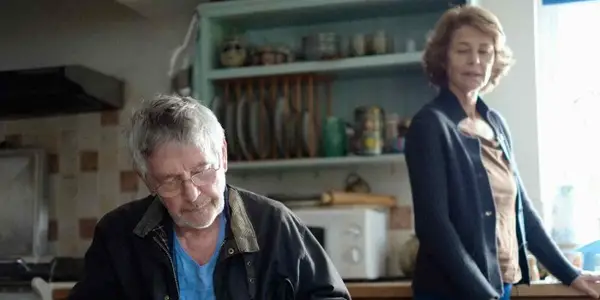
Both films have artificial set-ups on paper; after all, the idea of two people falling in love in three days and the idea of an ex-girlfriend who died fifty years earlier finally being found on the eve of a wedding anniversary are both unlikely propositions. It is to Haigh’s credit as a screenwriter that he gives all his characters naturalistic conversations around these incidents that show how fully realised they are, making everything on screen feel realistic, as contrived as the situations they are in may be. They feel like living, breathing people who exist outside of the screenplay, who just happen to be caught in melodramatic circumstances.
The film expertly documents this dramatic shift in their relationship; although they don’t break up, the spectre of another woman, Nadia, from years before hangs ever present in the air surrounding the couple wherever they go. Kate (Rampling) becomes prone to an unusual form of jealousy: she knows her husband won’t leave her, yet worries that she won’t be able to compare to the memory of a woman from years before. If Nadia hadn’t died, would she even be in this marriage? Geoff points out that as the authorities thought they were legally married in order to cross European borders without question, he is listed as Nadia’s next of kin. After decades of not hearing about her existence, suddenly Kate has to share her husband not with a woman, but an idealised memory of a woman that her husband never got the chance to marry, but very likely would have. Leading up to an anniversary party for friends and family, she naturally feels like the human equivalent of a consolation prize, instead of a trophy wife.
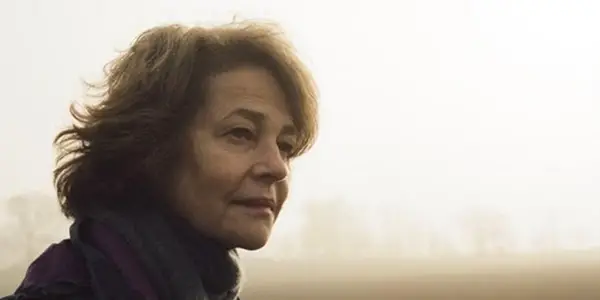
With two consecutive films operating as intimate character studies, Haigh writes screenplays that allow actors to give some of their best performances. Even with the stunning cinematography, he creates an intimate atmosphere that allows you to drown out any filmmaking flourishes in order to focus solely on the performers. It has been a while since either Rampling or Courtenay have been given roles this good; in the case of Rampling, she has recently collaborated with Lars Von Trier, as well as multiple appearances in the films of Francois Ozon (a director whom Haigh feels like the British equivalent of). However, in the last five years, she has also taken thankless roles in StreetDance 3D and the utterly awful final season of Dexter. Courtenay has at the very least been well served with masterful theatre performances, with 45 Years operating as a rare chance to see his talents utilised on the big screen by a director who actually gives him challenging material, instead of coasting by on his legend status. These are roles defined by the things the characters don’t say, the unspoken words hanging in the background of every dialogue between the couple; even as the characters get increasingly emotionally honest, there is an air of uncertainty that ensures these roles never stop being complex, right down to the thrillingly ambiguous final scene.
The Filmmaking never challenges the performances
The thing that stops 45 Years from ascending towards the top of my best films of the year is simple. The fact you are never distracted from the filmmaking flourishes means that it doesn’t feel like a truly cinematic event; it is emotionally engaging to a tee, but would achieve that status equally on stage or on television. The cinematography is unquestionably excellent, but it is a rare case where seeing it on the big screen isn’t a deal breaker. In fact, cinematographer Lol Crawley’s most cinematic project to date has actually been for television, where he was the director of photography for British sci-fi series Utopia. That show (in my opinion the finest British drama series of the decade) transcended its utterly bleak narrative by the overwhelmingly bright colour palette, ensuring it remained visually unique, transcending the boundaries of television to feel like you had to see it on a big screen, but never would.
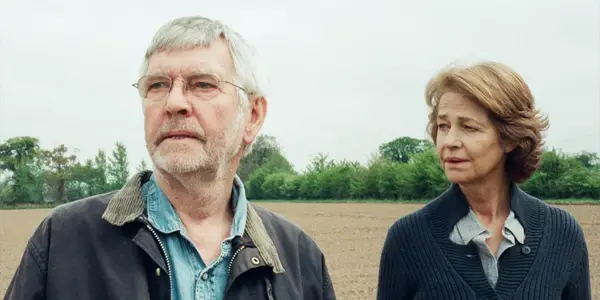
45 Years looks stunning in the opposite way, with the bleak weather conditions of the Norfolk Broads setting proving an apt visual metaphor for the couple’s relationship woes. If anything, a major problem is that it may be too on the nose; the flat lands of Norfolk contrasting directly with the mountainous Swiss terrain where Nadia has been found. When the sounds of rainstorms and distant thunder are reduced to their most minimal in the soundtrack, their presence heard during the couple’s intimate bedtime conversations, the obvious metaphor doesn’t prove distracting, if only because seeing at a cinema, you are left feeling that it must be heavily raining outside, so rich is the sound design.
Conclusion
All of Haigh’s work (as well as these two films, his HBO series Looking) concerns people having naturalistic conversations where they try and contextualise their lives and relationships in order to find their place in other people’s lives. Of his work that I’ve seen, 45 Years is the best acted, but the least successful overall, with its reliance on conventional metaphors for disintegrating relationships stopping it from transcending to the truly great status of his prior film and TV work. It is however, his most mainstream work to date, if only because this is the first time he hasn’t touched on the subject of gay men’s sex lives in extensive detail. Here, realism is achieved through the grounding power of performances alone. If 45 Years succeeds, it will be in waking people up to the fact that he may be one of the best screenwriters working today, one defined by writing rich characters of the type ignored in modern popular culture.
Which relationship dramas have you been most affected by? And what is the most sensitive portrait of an ageing couple in cinema?
45 Years is out now in the UK and all international release dates can be found here.
(top image source: Film4)
Does content like this matter to you?
Become a Member and support film journalism. Unlock access to all of Film Inquiry`s great articles. Join a community of like-minded readers who are passionate about cinema - get access to our private members Network, give back to independent filmmakers, and more.
Alistair is a 25 year old writer based in Cambridge. He has been writing about film since the start of 2014, and in addition to Film Inquiry, regularly contributes to Gay Essential and The Digital Fix, with additional bylines in Film Stories, the BFI and Vague Visages. Because of his work for Film Inquiry, he is a recognised member of GALECA, the Gay & Lesbian Entertainment Critics' Association.













